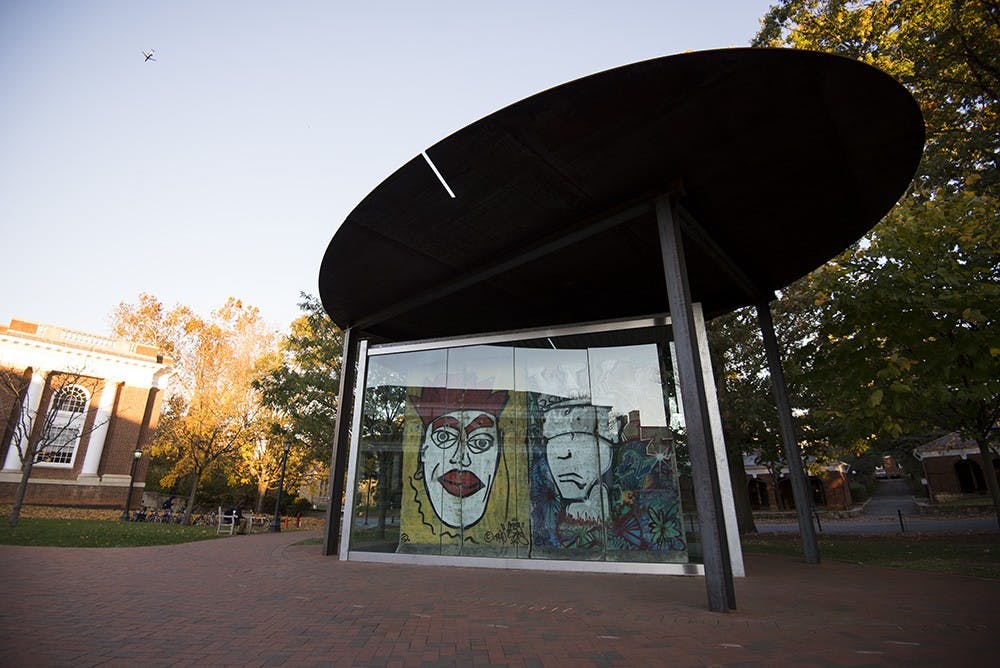The University will host a symposium this week to celebrate the 25th anniversary of the fall of the Berlin Wall.
Art collector Robert Hefner loaned two pieces of the Berlin Wall to the University, currently on display outside Alderman Library. Jody Kielbasa, vice provost for the arts and director of the Virginia Film Festival, has been instrumental in planning the symposium surrounding the pieces of the wall.
“The University was very fortunate that Robert Hefner wanted to loan the wall,” Kielbasa said. “It is an extraordinary piece of history, and also very timely, because the 25th anniversary of the fall of the wall is Nov. 9.”
Kielbasa said the wall is a symbol not only of oppression, but also a symbol of the power to overcome oppression.
“I think it’s very fitting that the wall would be on Grounds of the University within a few hundred yards of the Rotunda and Thomas Jefferson’s vision, [as he] was also the architect of our own remarkable symbol of freedom and independence,” he said.
Commemorating the Berlin Wall with a symposium is an opportunity for students, faculty and community members to learn more about its implications.
“I was born in 1958, and when you think about it, when I was born, World War II was not that far away, and now it’s almost a distant memory,” Kielbasa said. “I’ve found that a lot of students in college are not altogether all that familiar with the history of the Cold War or the Berlin Wall, so I think it’s an incredible opportunity to become more aware of that.”
Kielbasa said he also views the wall and the symposium as a reminder of what could happen in the future.
“This could happen again,” Kielbasa said. “I think it’s really important to be aware of past history and how history can in many ways repeat itself.”
Over 15 University offices, departments and programs are hosting and supporting events at the symposium.
The Center for German Studies is a key contributor. Religious Studies and Jewish Studies Prof. Asher Biemann, who also serves as director of the Center for German Studies, said the fall of the Berlin Wall is more than just a historical event.
“We jumped at the opportunity to participate in this event to present other events and discussions that would expand our thinking about the historical moment of the fall of the Berlin Wall, what it means to think about walls in general and what it means to think of walls today,” Biemann said.
The Center for German Studies is focusing on a reading and discussion with author Salomea Genin, who lived in the former German Democratic Republic in the 1960s and was a member of the communist party.
“[Genin] was herself a functionary of the communist party ... then later [had] a revelation that changed her political opinions and political persuasions,” Biemann said. “She will be speaking about what it meant to live as a German Jew in the former GDR.”
The Center for German Studies is also supporting a roundtable with Eduard Fuehr, German architectural historian and theorist, and Janet Ward, author and professor at the University of Oklahoma.
“There is a roundtable with visitors from Germany and from the [United] States speaking about the idea of walls in general, so it’s exactly what our center really represents: an expansive thinking beyond the bounds of Germany,” Biemann said.
The University’s Center for Politics, in partnership with the Batten School, will host a panel discussion with Sergei Khrushchev, Klaus Larres, Mary Beth Stein and Allen Lynch. Center for Politics spokesperson Geoffrey Skelley said the panel discussion fits into the Center’s Anniversary Series, which focuses on landmark political events in American history.
“The panelists, of whom have deep understandings of the geopolitical and societal shifts wrought by the end of the Cold War, will shed light on what the world looked like in 1989 and how things have changed in the post-Cold War period,” Skelley said in an email.
The fall of the Berlin Wall heavily impacted politics in the Unites States and around the world, Skelley said.
“The Center is committed to highlighting the politics and history of the United States to improve civic engagement, and the Cold War defined nearly 50 years of international and domestic politics,” Skelley said. “The fall of the Berlin Wall was a highly significant moment in bringing about the end of that period and thus deserves commemoration.”
The Virginia Film Festival will include five films relating to the Cold War and the fall of the Berlin Wall as part of the symposium, including “Wings of Desire,” “Red Army” and “Dr. Strangelove or: How I Learned to Stop Worrying and Love the Bomb.”
The symposium also features a variety of art installations, including a piece from mural artist Sam Welty on the Downtown Mall, theatrical productions written and directed by professors in the University’s Drama Department, and a photography installation by Gar Hoover on the Rotunda West Side Construction Fence.
“I think it’s about the experience,” Kielbasa said. “We have a very diverse symposium that looks at a number of disciplines and explores the political, historical, social and cultural impact that both the Cold War and the Berlin Wall had on the world. I hope that students, faculty and staff attend the symposium and find something within it that piques their interest.”







